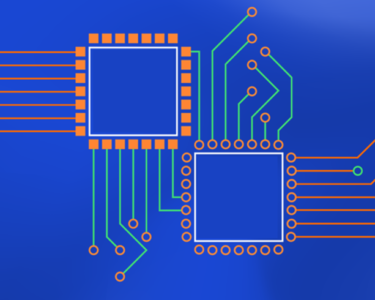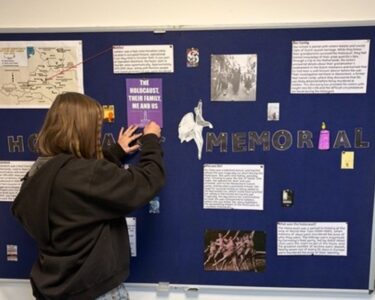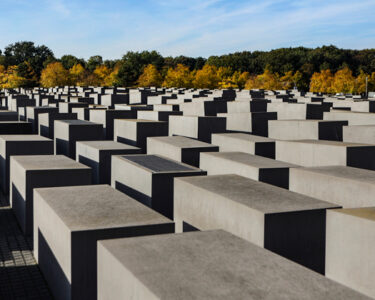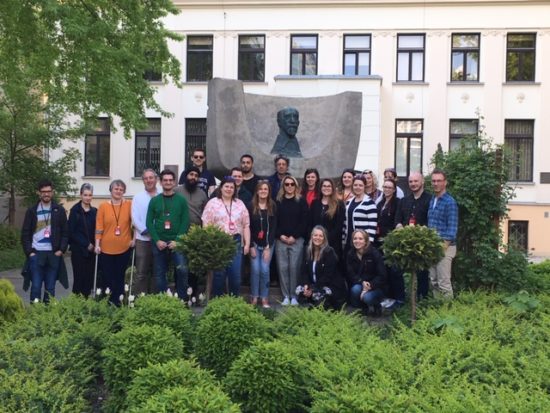
“Visiting Poland and the Beacon School programme is the single most influential experience I’ve had while teaching. This programme has sparked a desire to teach the Holocaust in a more nuanced and effective way, which will last a lifetime as I continue to engage in research led practice“. – Jordan Hobbis, Studley High School
Two weeks ago Centre colleagues accompanied our 2018-19 Beacon School Lead Teachers, 16 teachers from across England committed to improving their provision for and experience of Holocaust teaching and learning in their schools and communities, on our annual study visit to Warsaw and its environs.
The four-day Poland visit (10-13 May) involved excursions to sites to discover what life was like for thriving Jewish communities before the Nazi occupation, to consolidate and deepen knowledge and understanding and enrich classroom practice. The cohort examined the resurgence of Jewish life in Poland today through a special bread-baking workshop, through a visit to the Nożyk Synagogue on the eve of the Sabbath and an excursion to the former Jewish shtetl of Jadów. As our Lead Teachers walked through the former ghetto, stopping at points of significance and remembrance, they engaged in creative tasks that brought about powerful encounters with the past. The trip also saw Lead Teachers visit the death camp of Treblinka site and spend time at the Jewish cemetery in Warsaw.
Throughout, our teachers considered site-based pedagogy and reflected upon the significance of the spaces encountered and wrestled with difficult and uncomfortable questions:
- At site of the ghetto wall: ‘What keeps you inside? Is it the wall, fear or something else?
- What makes a ‘good’ question?
- What do we choose to remember? What do we choose to forget?
- How do you see what isn’t there? How do you capture the void?
- Why is it overgrown with trees?
- What makes site-based pedagogy and visits distinctive?
Whether in our exploration of Jadów, once a bustling town of 2000, or in teachers looking for traces of pre-war Jewish life; including the Great Synagogue and Emanuel Ringelblum Jewish Historical Institute we encountered the void left by the murder of its Jewish population. We explored the complexity of Holocaust remembrance, memory and commemoration, whilst deepening our subject knowledge and understanding. We encountered personal stories – the life and death of Janusz Korczak, the legacy of Karski and Ringelblum, the poetry of Wladyslaw Szlengel, the words of Abraham Lewin and humanising the history, giving them a voice was key to our approach – indeed at Nożyk Synagogue Ruth-Anne sought to capture the essence of the space, an insight to the life of the community, filling the void with a shabbat prayer.
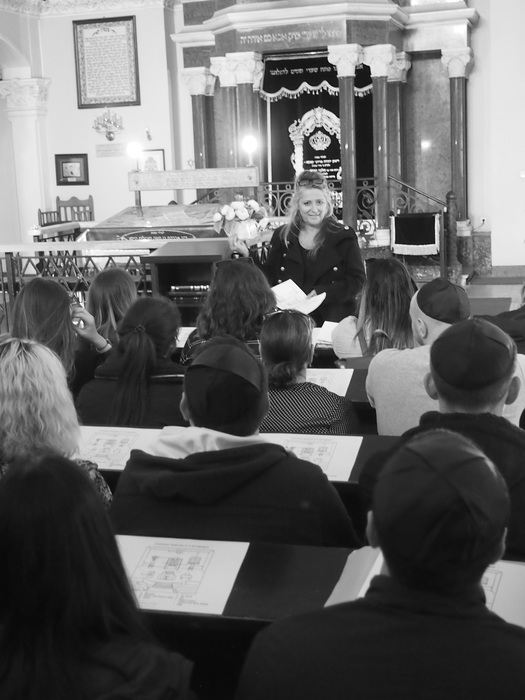
Niskham School’s Hannah Moody reflected on our visit to Warsaw’s Jewish cemetery and a question posed: “Why is it overgrown with trees? …Because the children and grandchildren who should be caring for it now were never born. That is what genocide means.”. Whilst Corey Soper of Jewellery Quarter Academy noted: ‘Our #BeaconSchool1819 journey’s comes to a close with a moving tribute to the inestimable Janusz Korczak who we have followed throughout our journey with @UCL_Holocaust education. I am awed by this experience.’ Amidst that void and the poignancy of our study visit, our teachers left inspired by Korzack and empowered as pedagogues and advocates for human rights to move their Holocaust teaching and learning forward.
The learning was profoundly shaped by the sites visited and the individual stories explored. Together the lead teachers shared their own school and classroom experience and insights and were able to draw on the wisdom and expertise of Centre colleagues to enrich, understand and challenge thinking. We were delighted to welcome former colleague Paul Salmons as our guest lecturer, and to collaborate again with our in-country guide, Kuba. Together #BeaconSchool1819, Paul, Kuba and Centre staff shared a collaborative and deep learning experience. These remarkable teachers and their 16 Beacon Schools join over 120 other schools and Lead Teachers of the Beacon School alumni family; despite the challenging nature of the trip and diversity of the communities and contexts our lead teachers serve there were smiles and laughter too, and friendships deepened. The bonds and memories of our experience will remain – the learning experience lasting and sure to be impactful.
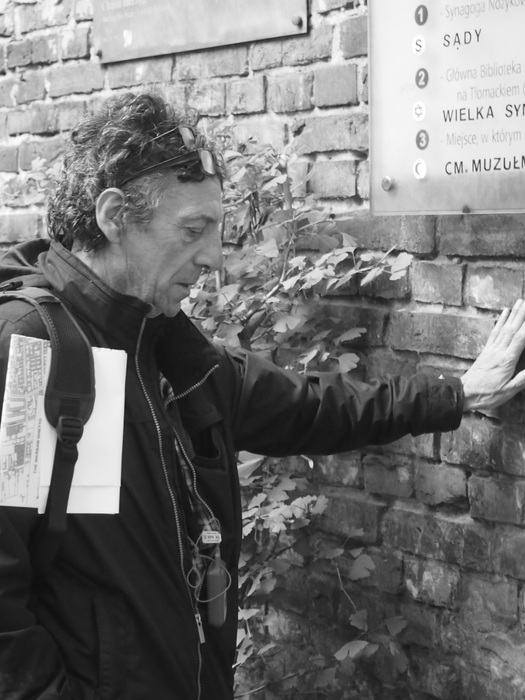
The teachers on this year’s programme come from a variety of schools across the country, some of which are in particularly disadvantaged areas. Each school is committed to developing its Holocaust teaching and learning, but the character, geography, contexts, communities, challenges and opportunities faced by each is wide-ranging. St Clare’s SEND Secondary School is among our cohort and Lead Teacher Patrick Hill reflected on the emotional and instructive visit thus:
“The devastation and destruction of the Jewish population in Warsaw was conveyed in very concrete examples, hopefully I will be able to convey to our students. The different threads all weave together to create a rich tapestry of Jewish life before and during the Holocaust and the void that has been created. From a pedagogical view, the trip was a timely reminder that on field trips and in the classroom we should aim to create enquiries in which students have agency rather than using the “point and tell” approach. I will also be exploring the thoughts of Janusz Korczak on education and childhood.”
A fellow Lead Teacher, Sophie Davies from Hendon School, offered the following reflections:
“A huge thank you for allowing me to be a part of the wonderfully interesting trip. It was an insightful and carefully thought out weekend that I’ll remember forever. Much of the information was new to me and it was incredibly moving. For my students I hope to be able to convey the gravity of what occurred in such a poignant manner. Thanks to this programme I am able to create a new scheme which focuses on the big questions and hopefully allows me to teach the Holocaust in a way which does it justice.
It wasn’t just our teachers reflecting on the experience. The Centre’s Tom Haward noted that:
“One of the many powerful things I’ll take from the visit was the contrast between the Catholic and Jewish cemeteries at Jadow, a small town about an hour’s drive from Warsaw. It raised really interesting questions about the ways they are tended and looked after, or broken and neglected. Thinking about why this might be raises questions of the impact of the void – the disappearance of the entire Jewish community of Jadow during the Second World War – and how the way the community is now is shaped by the past.”
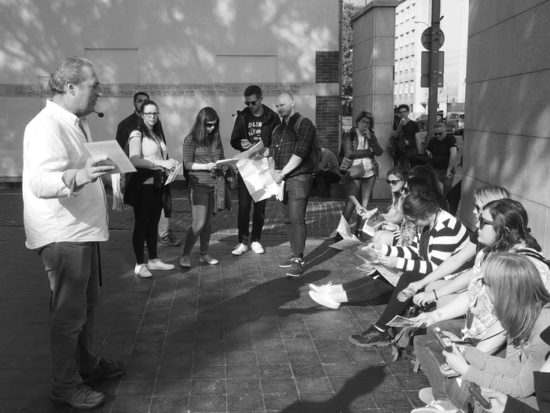
Our visit occurs as the Beacon School teachers develop their Schemes of Work about the Holocaust back in their own school in England. Our Centre’s ‘Jewish Life in Europe’ lesson is increasingly incorporated into the Schemes of Work our Beacon Schools teachers develop, and this visit helped to enhance thinking about what Jewish life would have been like here. During our time in Poland several teachers spoke of their reflecting on how a case study of Jadow could help their students appreciate what was lost through a re-telling of the lives of the Jewish community that once lived there. The phrase ‘we should never forget’ the victims of the Holocaust then becomes more meaningful as students have a better of understanding of what was lost, and the impact of that loss on small Polish towns like Jadow today.
The Centre’s Executive Director, Professor Stuart Foster, accompanied the cohort and remarked:
‘It was a privilege to spend time in Poland with our excellent Beacon School teachers. As ever, the visit to Warsaw and Treblinka was powerful and thought-provoking and it was very evident the experience had a profound impact on our outstanding teachers. In, particular, the visit emphasised the importance of students learning about pre-war Jewish life and the vibrant and diverse communities which were ultimately destroyed by the Nazis and their collaborators. Appreciating what existed before and what was lost (‘the void’) is fundamental to any serious understanding of the brutal consequences of genocide. It also compels us to examine how and why this could happen in ostensibly educated, modern and ‘civilised’ societies. I am confident that all the teachers will reflect carefully on the visit and continue to work closely with our Centre to develop educational programmes that will have a significant and positive impact on their schools and the broader community. We look forward to our continued partnership and meaningful collaboration.’
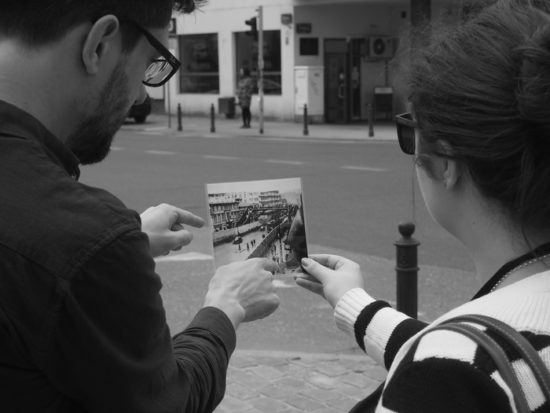
It is fitting to end with thanks to our Lead Teachers and their schools for their continued commitment to the Beacon School programme and to their active participation in the trip. We would also like to acknowledge Paul and Kuba’s invaluable contribution, along with the Centre’s: Stuart, Ruth-Anne Becky, Nic, Emma, Tom* and Mike – along with Shazia’s London based logistical and pre-visit administrative support and planning, and to Sir Trevor Pears for joining us for part of this positive, important, rich and powerful shared learning opportunity, it was another very special study visit. We look forward to hearing how this trip infuses and enhances the schemes of work, Holocaust provision and practice.
*We are especially grateful to Centre’s Tom Haward for permission to use his beautiful black and white photography, which so captures the atmosphere and essence of our trip, and to Ian Whitehorn who accompanied us, for his group shot at the Korzack orphanage.

